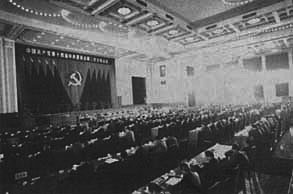| 
The plenary session agrees to establish a socialist market economy (LIU YU)
The Third Plenary Session of the 14th Central Committee of the Communist Party of China (CPC), held in Beijing from November 11 to 14, adopted a decision on issues concerning the establishment of a socialist market economic system, according to a communique released from the meeting.
The session specified in the document the goals and basic principles for restructuring the economy set by the 14th National Party Congress held in October last year.
The decision will serve as an overall plan and a program of action for establishing a socialist market economic system in the 1990s. It will have a major and far-reaching impact on the country's reform, opening up and socialist modernization drive, the communique said.
Great changes have taken place in China's economic system after 15 years of reform under the guidance of Deng Xiaoping's theory of building socialism with Chinese characteristics, the communique noted.
Restructuring of the rural economy continues to deepen. The management mechanism of state-owned enterprises is being transformed. The role of the market is expanding swiftly in the disposition of resources. Economic and technological exchanges and cooperation with foreign countries are widening. The planned economic system is being gradually transformed into a socialist market one.
"We should firmly grasp the favorable domestic and international opportunity to speed up the process of establishing a socialist market economic system and bring about a sustained, swift and sound development of the national economy," the communique said.
The communique pointed out that establishing a socialist market economy means making the market a fundamental factor in the disposition of resources under state macro-control.
To achieve the goal, the communique said, it is necessary to adhere to the principle of developing the economic sectors with public ownership as the mainstay while encouraging development of economic sectors with other forms of ownership, and establish a unified and open market network. Government functions in managing the economy should be reformed. An income distribution system with the principle of distribution according to work done as the mainbody while giving priority to efficiency and stressing fairness should be founded, and a multilevel social security system be set up to provide urban and rural residents with social security in line with the country's conditions.
According to the communique, the session reiterated the importance of sticking to Deng's theory, adding that the implementation or elimination of reform measures will be decided according to whether they are beneficial to the development of the productive force. Enhancing China's economic might and improving the people's living standards are also of major importance.
At present, the communique said, priority must be given to the establishment of a modern enterprise system and to reforms in banking, taxation, planning, investment, foreign trade and other major fields. | 